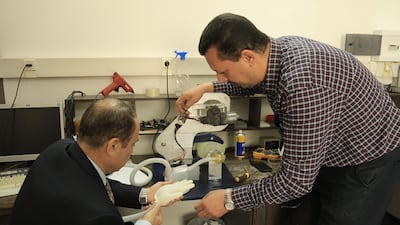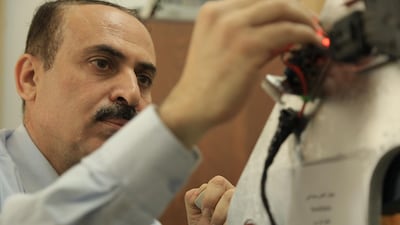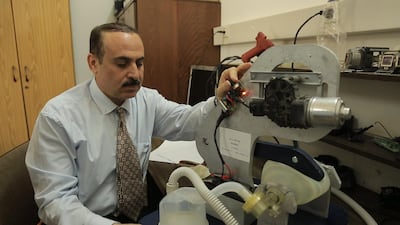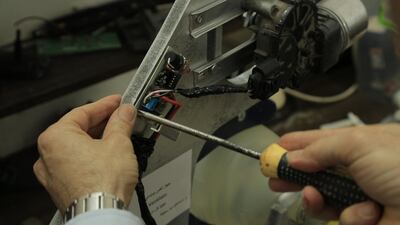For a population of 2 million people, the Gaza strip has just 60 ventilators. Of that number, 15 are damaged and unusable. The remaining 45 are all being used by patients who's life depends on them.
That leaves approximately zero for any victims of the coronavirus pandemic; a looming crisis the embattled Palestinian territory is desperately attempting to stave off.
And now, two Gazan engineers think they might have an answer: a prototype for a ventilator that costs as little as $200.
The first two Covid-19 patients in the Gaza strip were confirmed by the Palestinian Ministry of Health on March 22. Both of the confirmed cases were Pakistani citizens and were quarantined at a new field hospital in Rafah, in the south of Gaza. Since then, 11 more patients have been confirmed to have the virus, and the implications of a widespread outbreak loom large.
Ismail Abu Skheila and fellow engineer Esam Khalafallah were well aware of an impending crisis, and the disastrous effects a community outbreak could have on the war-ravaged region. So, they set about trying to help.

"I love and fear for my family and I'm very worried about the situation in Gaza," Mr Abu Skheila tells The National.
"The health care system had already been deteriorating before this pandemic came. If this virus spreads more, the results will be catastrophic because Gaza has been living under a devastating blockade for more than 13 years now and I believe the health care system here is so poor it's almost nonexistent."
Mr Abu Skheila, who now works as the director of the engineering office at the Islamic University in Gaza, and holds a master's degree in architecture, says they began looking for spare parts to help them build a new kind of ventilator that would be much cheaper to produce.
However, the blockade made it difficult to find sufficient materials.
"We can’t import what we need from the outside because it would take a long time," he says.
"Of course, we realise this device would not be as efficient as the original $50,000 devices. But our aim was to find something cheap that would achieve its goal and help coronavirus patients in Gaza."
The Islamic University of Gaza backed the project, and supported the development of the idea.
The prototype uses a wiper motor from a car, because they are cheap, readily available and can run for 24 hours. The ventilator runs on regular electricity, but can work on a 10-hour battery in the event of a power cut. They can also be linked to a mobile phone to allow it to be controlled from a distance.
"We have no materials whatsoever in Gaza," Mr Abu Skheila says.
"There are no skill shortages in Gaza, however, there is a shortage of everything else.
"We are suffering, right now as we are trying to run this device, we are suffering from the lack of small modern technologies. Things we need to make this device work, we don't have, special devices for pressure for example. But hopefully, this is better than nothing."
The pair have been working on building the prototype for about a week, and believe they need five or six days more to fine-tune it. After that, it will be delivered to the Ministry of Health for further testing. Representatives from the ministry had already seen the prototype and were cautiously optimistic about its practicality, but had asked for some modifications.
"After that we will hopefully be able to work on manufacturing devices more rapidly to help save the Gaza Strip if we reach that stage," Mr Abu Skheila says.
"What makes this device special is its low cost and the fact it can be made in a short period of time."
Rami Al Abadla, director of epidemiology at the Palestinian Ministry of Health, says they had been in contact with the two engineers and were "very proud of them".
"The device looks very effective. If all the materials for this device are available in Gaza and they can actually make more of it, we would absolutely welcome it."
Normal ventilators were often in excess of $25,000 to buy, Mr Al Abadla says, and even if they could afford it, the global shortage meant it was almost impossible to buy them.
And due to the fact their current ventilator stocks were all in use, by patients who would "die without them", it meant that "right now, we have zero ventilators for any potential coronavirus patients".
"This is why we believe this is a very good thing and we will certainly support it, even if it helps the patients temporarily."
Ashraf Al Qedra, spokesperson for the Palestinian Ministry of Health, said the coronavirus patients in Gaza were currently "stable and healthy".
So far, 1148 tests for the virus had been conducted, with 12 coming back positive. Five patients have recovered, while seven remain in hospital.
Medical staff were now following up with 1897 people across 27 quarantine centres. However, there was a "huge shortage of coronavirus testing kits", Mr Al Qedra says, estimating that they would lose the ability to conduct any tests "in a few days".
Construction of a new field hospital in Rafah began in mid-March and is expected to be ready within days. The hospital will provide 1000 rooms, which will be exclusively used as quarantine facilities.
However, he said the Ministry of Health was still in desperate need of at least 100 ventilators and 140 ICU beds. He estimated the battle for coronavirus would require $23 million of international support.
"The needs are huge," Mr Al-Abadla says. "We need the international community to work effectively on this issue and help us."





















